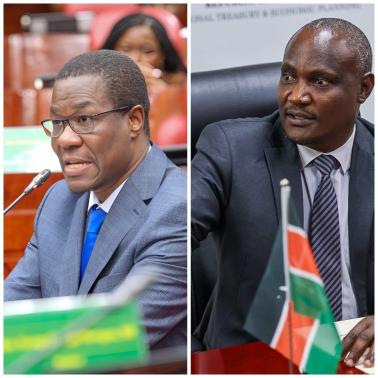MPs probe Sh30bn power debt, costly deals, and idle mini-grids

The audit follows concerns raised by the Auditor General on Kenya Power’s strained financial health and its inability to recover billions spent under government-backed projects.
The National Assembly has summoned Energy Cabinet Secretary Opiyo Wandayi and his Treasury counterpart John Mbadi to explain a Sh30 billion debt owed to Kenya Power and address rising electricity costs that have sparked nationwide concern.
The National Assembly’s Public Investments Committee on Commercial Affairs and Energy issued the summons as part of an ongoing inquiry into government arrears and stalled mini-grid projects meant to serve remote communities.
Also expected to appear before the committee on August 5 are officials from Kenya Power, the Rural Electrification and Renewable Energy Corporation (Rerec), and the Energy and Petroleum Regulatory Authority (Epra).
Committee chairperson David Pkosing said the meeting will help chart a path to settle the utility firm’s claims, which stem from the Rural Electrification Scheme (RES)—a government-funded programme implemented by Kenya Power to supply subsidised electricity in underserved areas.
While the projects are vital, they operate at a loss, with the government expected to cover the deficit under a longstanding agreement signed in 1973.
“The people of Kenya are paying too much for electricity and one of the suspects are IPPs and their power purchase agreements,” said Pkosing. “We know they might be owned by the who is who in our country which raises suspicion. We will use the forensic audit to make firm recommendations that serve Kenyans better. We must change how these agreements work for the good of the country.”
Pkosing made the remarks as the committee began a fresh review of all power purchase agreements signed between Kenya Power and Independent Power Producers (IPPs), citing their possible role in driving up energy costs.
Kaloleni MP Paul Katana supported the scrutiny, saying powerful individuals had been linked to some of the IPP deals. “This has been a serious issue. Last time, we asked how quickly these power companies were licensed and learned that many powerful leaders were behind them,” he said. The Energy CS must tell us how many companies are licensed, the kind of agreements in place and whether they are serving Kenyans as intended.
The audit follows concerns raised by the Auditor General on Kenya Power’s strained financial health and its inability to recover billions spent under government-backed projects.
The committee also pointed to 30 mini-grid systems built in arid and semi-arid areas by Rerec but lying idle years after they were handed over to the utility.
Kenya Power CEO Joseph Siror, appearing before the lawmakers, defended the role of IPPs, saying the method of electricity generation largely dictates pricing.
The cost of power depends on the technology. Historically purchases have been expensive but going forward, costs should come down as we retire old and costly IPPs. This should make electricity cheaper for everyone, he said.
However, Siror noted that the country still relies heavily on IPPs to meet its electricity needs. We retired one last year. But you cannot retire all of them. In the past three months alone, we've had to load-shed, which means blackouts for many areas. If we turned off all the IPPs today, more than half the country would face blackouts because we wouldn't generate enough electricity to meet demand.
The committee maintained that future power deals must be more beneficial to consumers. “We must find an arrangement that is cost-effective for Kenyans by balancing production with demand,” said Pkosing. “We should also work towards cheaper technology for power generation so electricity becomes more affordable for all.”
